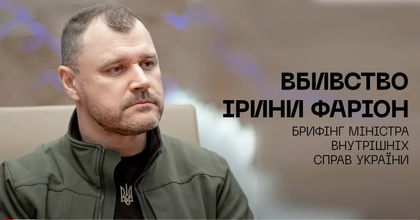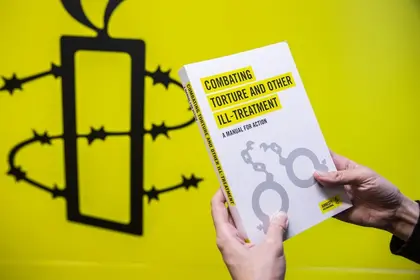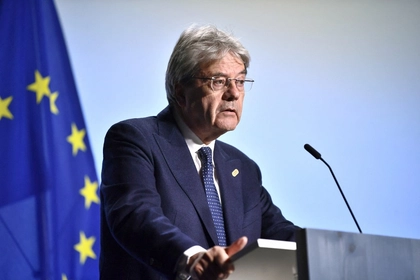Ukrainians' concerns about Amnesty International’s position on Ukraine were dismissed at a key meeting of the human rights organisation’s branch in Australia and they are “traumatised” by their treatment.
In June, Amnesty International Australia held its Annual General Meeting of members (AGM) in Sydney with a group of people impacted by Russia’s full-scale war against Ukraine participating.
JOIN US ON TELEGRAM
Follow our coverage of the war on the @Kyivpost_official.
Together with representatives of the Uighur and Hazara refugee diasporas in Australia, as well as participants with connections to Myanmar, Taiwan, China, Tibet, and Hong Kong, the Ukrainian community members had recently joined Amnesty International to, according to them, “bring to Amnesty our lived experience of confronting egregious human rights abuses, including war crimes, genocide and crimes against humanity against our people.”
At the online AGM, Ukraine-connected paticipants, led by community leader Anton Bogdanovich, put forward a resolution stating that the AGM “stands in strong solidarity with the people of Ukraine and Ukrainians around the world” and “strongly condemns Russia’s war and crime of aggression against Ukraine.”
The resolution went on to “endorse the commitment from the [Amnesty International] International Board to ensure future media releases [see below] are more carefully considered and apologise for the distress and anger the media release [about the August 2022 Ukrainian war crimes report] caused.”

Farion’s Killer Prepared Disguises, Had Another Victim in His Sights, Interior Minister Says
After the resolution was put and debate ensued, it appears from accounts that the meeting’s chair delayed the vote to apparently restore order to a meeting that risked becoming raucous.
However, an Australian human rights campaigner and then Amnesty member, Drew Pavlou, who was present at the meeting, alleges that the delay was manufactured by Amnesty’s Board Chair, Mario Santos, to “rig the vote” against the Ukrainians’ resolution.
“Ukrainian representatives introduced a motion at Amnesty International Australia AGM to condemn the false war crimes report slandering Ukraine,” Pavlou, 24, told Kyiv Post.
He added: “Amnesty then baselessly accused the Ukrainians of threatening voters, using the excuse to delay voting for several hours. They used this extra time to rig the vote.”
After the lengthy delay, the resolution was put to an online secret ballot and defeated by 26 votes against to 23 votes for with eight abstentions.
Pavlou and other participants claim that several potential members in favor of the resolution could not vote because their online capacity to do so through Google Forms appeared to be prematurely closed down.
Bogdanovich, 45, is an IT academic based in western Sydney, whose parents, grandmother and brother have been in Ukraine throughout the full-scale invasion.
He has led actions by recently arrived Ukrainian refugees and others against multinationals, such as Pepsi, Nestle, Atlassian, HSBC, and Canva, who have continued to operate in Russia and provide tax revenue to its regime.
“In my view, Amnesty International is a fraud,” Bogdanovich told Kyiv Post. “They are an elaborate Ponzi scheme that defrauds people of donations and does nothing useful with them.”
“Ukraine finds itself in this horrific genocidal war because of organisations like Amnesty International and because of people like the management of Amnesty Australia,” he continued.
“Instead of fighting for human rights, Amnesty promotes a Russian agenda and Russian narratives and equates the victim with the aggressor. I call on Amnesty International Australia and Amnesty International global to: recognise what a disgrace their organisation has become; fire people responsible for turning it into a Ponzi scheme for donations and a Russian propaganda outlet; apologize properly, and; and engage proper human rights activists to restart the organisation,” Bogdanovich said.
Kyiv Post submitted detailed questions to Amnesty International Australia about the AGM and related issues, but has not received a reply at the time of publication.
Other resolutions at the AGM related to the treatment of Uighurs by the People’s Republic of China and the situation of the Hazara minority in Afghanistan were also defeated, according to Pavlou.
Following the tumultuous meeting, representatives of the Ukrainian, Uighur and Hazara communities and others have jointly written to Amnesty International Australia. In a letter obtained by Kyiv Post, they said they were “further traumatised” by the handling of the AGM.
“We have come to Amnesty to be part of a collective dream of creating a more just future for all. As communities on the front lines, we bring a unique perspective and credibility to the Amnesty movement,” the letter said.
“[However], our experience at the AGM… the first for all of us, has left us further traumatised and concerned about the cultural competency of Amnesty staff, including [its] leadership,” the letter, undersigned by 18 diaspora members from war-torn and/or repressive countries, continued.
In July 2022, Amnesty International – through its head office – released an investigatory report which accused the Ukrainian military of using civilians on Ukrainian territory as human shields and other actions that potentially constitute violations of international human rights.
In response to resounding criticism of the report’s methodology and conclusions, the International Board of Amnesty International commissioned both an independent academic and legal review and an internal management review of the press release associated with the report – though not the problematic original report itself.
Those reviews made some criticisms of the press release, but in no way suggested the retraction or even further review of the original report.
Thereafter, the International Board issued a statement in May 2023 – some 10 months after the report - where it committed, among other aspects, to “ensuring that impartiality remains fundamental to our research and advocacy.”
Following the Australian AGM, the Board of Amnesty International in Australia decided on August 19 to remove Pavlou’s membership for “conduct and behaviour not consistent with the standards expected of a member at the AGM, in breach of the [Amnesty International] Code of Conduct and Values & Behaviours Charter.”
Pavlou disputes the allegations and said that he is appealing his removal. He believes that his own expulsion is “designed to send a message to Anton and the Ukrainians.”
“Their core complaint against me was that I questioned the integrity of the vote on the Ukraine motion,” Pavlou said.
“I will appeal my expulsion and if necessary I will take this all the way to court. I will fight them tooth and nail because they can't get away with running a human rights organisation like a petty dictatorship.”
You can also highlight the text and press Ctrl + Enter






